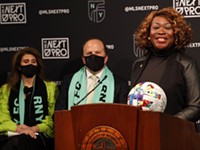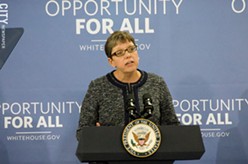[
{
"name": "500x250 Ad",
"insertPoint": "5",
"component": "15667920",
"parentWrapperClass": "",
"requiredCountToDisplay": "1"
}
]
[UPDATED AND REVISED 11.27.18] Long-simmering tension between Monroe Community College President Anne Kress and the Faculty Senate and Faculty Association has erupted in a strong no-confidence vote by the Faculty Association, the MCC faculty's union.
Of the 502 full-time and part-time teachers who voted last week, 88 percent supported the no-confidence resolution. The vote by faculty represents 60 percent of those individuals eligible to vote, Kress said at a press conference on Tuesday in response to the no-confidence vote.
Some CSEA employees and retired employees also cast votes of no confidence.
“Our overwhelming, multi-campus direct vote of No Confidence presents a clear request to the tax-payers and students of Monroe County: We collectively insist on a full and transparent evaluation by the MCC Board of Trustees and her assigned managerial team,” the Senate and union said in a statement this morning. “In addition we jointly agree that the Board of Trustees consider the dismissal or resignation of any member of the CEO’s selected team – including but not limited to the CEO herself – if they are found to fail appropriate standards.”
At Tuesday's press conference, Kress refuted nearly all of the criticisms brought up by the union and she said she is not considering resigning. The vote did not come as a surprise to her, she said, and she said she was disappointed that union leaders decided to "negotiate away from the table like this."
There have been tensions between the faculty and the administration in the past, but this time the dissension has become so public that it could damage the institution.
Kress’s problems at MCC are in stark contrast to her external image. Since her installation as president in 2009, she has become one of the most recognizable public figures in the region. Under her leadership, MCC has positioned itself as an important source of skilled labor and opened a new downtown campus.
Though she's not from Rochester, she's one of the area’s most ardent promoters. In 2016, Governor Cuomo appointed her co-chair of the Finger Lakes Regional Economic Development Council. She is a trustee of the New York Power Authority and a trustee of the Upstate Regional Advisory Board of the New York Federal Reserve Bank.
Locally, she serves on the boards of the Greater Rochester Chamber of Commerce and the Greater Rochester Enterprise, and she’s received numerous community awards for her work.
The administration’s contract negotiations with the union, which began in January and reached an impasse in June, appear to be a major factor in the faculty’s grievance. And the discussion about taking the no-confidence vote began back then, Kress said in an interview last week. The faculty has the right to ask for more money, Kress said, but if MCC is going to continue to provide students with the most affordable tuition possible, there are limitations.
“At a certain point, we just don’t have the resources,” Kress said.
But Amanda Colosimo, president of the Faculty Senate, and Bethany Gizzi, president of the Faculty Association, said the vote was not just over money.
“She doesn’t pay attention and make good decisions,” Colosimo said. The resolution of no confidence, a document containing 68 complaints against Kress and her management team, cites a lengthy list of what the faculty describes as “gross violations of contractual agreements” and “violations of the basic norms of collegiate shared governance.”
Among the complaints: that Kress has a bloated senior management team, employee discipline is inconsistent, employees have been intimidated, Kress has bought expensive but ineffective technology, and frequent reorganization of the administrative staff has created confusion.
The faculty also blames Kress for MCC's declining enrollment. The college enrolled nearly 13,000 students in the fall of 2018, a decline from the fall of 2013, when the enrollment reached nearly 16,500 students.
School officials argue that community colleges across the country are experiencing challenges with declines in enrollment, which are attributed to many factors. For instance, a strong job market tends to attract people who might otherwise have gone to college.
Many of the complaints, however, are over issues related to contract negotiations, which have required a mediator to step in.
Kress doesn’t appear to be in danger of losing her job. The MCC board of trustees issued a public statement declaring its “full support” of Kress and her leadership even before the no-confidence vote was taken.
“The Board of Trustees recognizes that differences in opinion exist and understands that regulations are in place to work through these differences in a fair manner,” wrote board chair Barbara Lovenheim.
Employees have many opportunities to set goals and share in the governance of the college, Lovenheim said in her statement.
But the faculty's no-confidence vote could make it difficult for Kress to lead. Negotiations have resumed with a mediator, but it’s unclear whether contract negotiations will settle the rift.
“We have to find a way to trust one another again, and that’s not going to be easy,” says the Senate’s Colosimo.
How the students are reacting to this development is a growing concern to both Kress and the faculty. Some students staged a walk-out late last month over the unresolved contract negotiation, and later some spoke out in support of the faculty. And students may be more naturally inclined to sympathize with their instructors, people they see frequently and know better than the administration.
Kress said she takes the faculty’s vote seriously and says she is mostly concerned about the negative impact the adversity could have on students and the community.
MCC offers degree and certificate programs in fields such as nursing, radiation technology, automotive technology, HVAC, precision machinery, food management, optical systems technology, and precision machining-optical fabrication.
“I think it could lead people to believe that MCC is less than it is when MCC is actually much, much more than people think it is,” Kress said.
Of the 502 full-time and part-time teachers who voted last week, 88 percent supported the no-confidence resolution. The vote by faculty represents 60 percent of those individuals eligible to vote, Kress said at a press conference on Tuesday in response to the no-confidence vote.
Some CSEA employees and retired employees also cast votes of no confidence.
“Our overwhelming, multi-campus direct vote of No Confidence presents a clear request to the tax-payers and students of Monroe County: We collectively insist on a full and transparent evaluation by the MCC Board of Trustees and her assigned managerial team,” the Senate and union said in a statement this morning. “In addition we jointly agree that the Board of Trustees consider the dismissal or resignation of any member of the CEO’s selected team – including but not limited to the CEO herself – if they are found to fail appropriate standards.”
At Tuesday's press conference, Kress refuted nearly all of the criticisms brought up by the union and she said she is not considering resigning. The vote did not come as a surprise to her, she said, and she said she was disappointed that union leaders decided to "negotiate away from the table like this."
There have been tensions between the faculty and the administration in the past, but this time the dissension has become so public that it could damage the institution.
Kress’s problems at MCC are in stark contrast to her external image. Since her installation as president in 2009, she has become one of the most recognizable public figures in the region. Under her leadership, MCC has positioned itself as an important source of skilled labor and opened a new downtown campus.
Though she's not from Rochester, she's one of the area’s most ardent promoters. In 2016, Governor Cuomo appointed her co-chair of the Finger Lakes Regional Economic Development Council. She is a trustee of the New York Power Authority and a trustee of the Upstate Regional Advisory Board of the New York Federal Reserve Bank.
Locally, she serves on the boards of the Greater Rochester Chamber of Commerce and the Greater Rochester Enterprise, and she’s received numerous community awards for her work.
The administration’s contract negotiations with the union, which began in January and reached an impasse in June, appear to be a major factor in the faculty’s grievance. And the discussion about taking the no-confidence vote began back then, Kress said in an interview last week. The faculty has the right to ask for more money, Kress said, but if MCC is going to continue to provide students with the most affordable tuition possible, there are limitations.
“At a certain point, we just don’t have the resources,” Kress said.
But Amanda Colosimo, president of the Faculty Senate, and Bethany Gizzi, president of the Faculty Association, said the vote was not just over money.
“She doesn’t pay attention and make good decisions,” Colosimo said. The resolution of no confidence, a document containing 68 complaints against Kress and her management team, cites a lengthy list of what the faculty describes as “gross violations of contractual agreements” and “violations of the basic norms of collegiate shared governance.”
Among the complaints: that Kress has a bloated senior management team, employee discipline is inconsistent, employees have been intimidated, Kress has bought expensive but ineffective technology, and frequent reorganization of the administrative staff has created confusion.
The faculty also blames Kress for MCC's declining enrollment. The college enrolled nearly 13,000 students in the fall of 2018, a decline from the fall of 2013, when the enrollment reached nearly 16,500 students.
School officials argue that community colleges across the country are experiencing challenges with declines in enrollment, which are attributed to many factors. For instance, a strong job market tends to attract people who might otherwise have gone to college.
Many of the complaints, however, are over issues related to contract negotiations, which have required a mediator to step in.
Kress doesn’t appear to be in danger of losing her job. The MCC board of trustees issued a public statement declaring its “full support” of Kress and her leadership even before the no-confidence vote was taken.
“The Board of Trustees recognizes that differences in opinion exist and understands that regulations are in place to work through these differences in a fair manner,” wrote board chair Barbara Lovenheim.
Employees have many opportunities to set goals and share in the governance of the college, Lovenheim said in her statement.
But the faculty's no-confidence vote could make it difficult for Kress to lead. Negotiations have resumed with a mediator, but it’s unclear whether contract negotiations will settle the rift.
“We have to find a way to trust one another again, and that’s not going to be easy,” says the Senate’s Colosimo.
How the students are reacting to this development is a growing concern to both Kress and the faculty. Some students staged a walk-out late last month over the unresolved contract negotiation, and later some spoke out in support of the faculty. And students may be more naturally inclined to sympathize with their instructors, people they see frequently and know better than the administration.
Kress said she takes the faculty’s vote seriously and says she is mostly concerned about the negative impact the adversity could have on students and the community.
MCC offers degree and certificate programs in fields such as nursing, radiation technology, automotive technology, HVAC, precision machinery, food management, optical systems technology, and precision machining-optical fabrication.
“I think it could lead people to believe that MCC is less than it is when MCC is actually much, much more than people think it is,” Kress said.
Speaking of...
-

Rochester New York FC to join new soccer league in 2022
Dec 8, 2021 -

Calendar preview: Workin' it out
Nov 12, 2020 -

Rochester-area colleges begin planning for a fall reopening
May 7, 2020 - More »
Latest in News
More by Tim Louis Macaluso
-

RCSD financial crisis builds
Sep 23, 2019 -

RCSD facing spending concerns
Sep 20, 2019 -

Education forum tomorrow night for downtown residents
Sep 17, 2019 - More »






